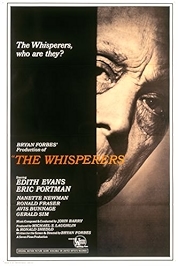As good a portrait of what it means to be old and lonely as any you’ll see, 1967’s The Whisperers is an atypical British movie for the Swinging mid-Sixties, almost a return to the kitchen-sinkers of the early part of the decade.
Bryan Forbes, who wrote and directed and was a smart man, understands the risks of making this film at this time and so doubles down on the “grim up north” stereotype, starting his film with visuals strongly reminiscent of the TV show Coronation Street – back-to-back houses, empty streets, dogs in the alleys rather than people, chimney-tops and brick walls – before bringing his focus in on one elderly lady.
He paints Mrs Ross in a series of strong establishing scenes. The old dear who writes letters to the authorities, signing herself as the Duchess of Argyll. Her daily routine of visiting the library to warm her feet. At the Christian mission in return for some hymn-singing she’ll get a bowl of soup. At the police station where Mrs Ross is clearly a regular she reports yet more imaginary concerns to the desk sergeant who rolls his eyes and gently sends her on her way.
This miserable but tolerable status quo is upset when Mrs Ross’s feckless and neglectful son turns up to use his mother’s home as a place to stash a bundle of hot cash, which she soon finds. It brings the vultures swirling – nasty neighbour Mrs Noonan (Avis Bunnage, superb) and her horrible family, and later Archie Ross (Eric Portman, also superb), the old woman’s estranged husband and a womaniser with an eye for the main chance.
How brilliantly Forbes and his DP, Gerry Turpin, situate Mrs Ross in her milieu, a solitary figure in a blasted industrial landscape – wartime bomb damage augmented by slum clearance – that’s reminiscent of the paintings of LS Lowry, with Mrs Ross one of Lowry’s matchstalk figures bent into the wind.
And how brilliantly Edith Evans plays her. She was Oscar nominated, which doesn’t usually mean very much – Oscar loves a theatrical Dame – but does here. For all the mention of the neighbours, the husband, the useless son, she is the centre of the film, and is in almost every scene, with the camera up close on her face, all internal worry, little sighs and quiet monologues as she goes about everyday tasks.
How much does Mrs Ross really understand of what’s going on about her? Evans’s performance suggests her distraction and dithering is about 50 per cent deliberate and that Mrs Ross’s reveries – of having once lived in a grand house, for example – are a way of escaping the crushing grimness of everyday life. She’s gone mad to stay sane, to paraphrase and simplify 1960s shrink-du-jour RD Laing.
One thing really stands out at this distance, and that’s the portrait Forbes paints of the welfare state: largely efficient, a bit officious and essentially benign. Mrs Ross makes many a visit to Mr Conrad (Gerald Sim, who often played roles like this) at the National Assistance, where he is unfailingly polite and often helpful. Later, in an extended hospital visit brought on by her big adventure with Mrs Noonan’s brood, she is treated with dignity in a well run, clean and orderly environment.
The soundtrack is by John Barry, but if you’re expecting James Bond you’re out of luck. In a score possibly influenced by Eric Spear’s theme to Coronation Street, Barry gives us plaintive and spare, the mood music you’d expect to complement a woman like Mrs Ross.
Looking for a negative, you could point to the figure of Archie Ross, and how Forbes’s film suddenly starts neglecting Mrs Ross in favour of the husband. It’s a fair enough charge. Archie is not who this story is about and the whole Archie interlude doesn’t sit entirely comfortably with the rest of the story.
But it doesn’t last long and then we’re back to Dame Edith Evans and her dizzy old dear. Watching her, remember she was primarily a stage actor and between 1915 and the late 1940s made no films at all. Then she handbagged herself into immortality playing Lady Bracknell in 1952’s The Importance of Being Earnest. It’s an understatement to say she’s pretty good here too.
The Whisperers – Watch it/buy it at Amazon
I am an Amazon affiliate
© Steve Morrissey 2024


